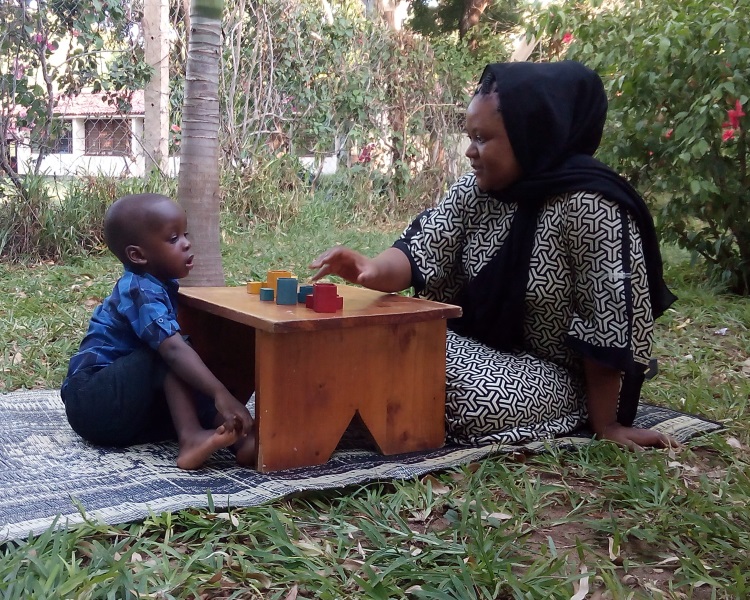Links to external sources may no longer work as intended. The content may not represent the latest thinking in this area or the Society’s current position on the topic.
2016 Royal Society Pfizer Award Seminar

2016 Royal Society Pfizer Award Seminar with Dr Amina Abubakar.
The Royal Society Pfizer Award recognises research scientists who are making an innovative contribution to the biological sciences, including basic medical science, which contributes significantly to capacity building in Africa.
The 2016 Royal Society Pfizer Award will be presented to Dr Amina Abubakar, KEMRI/Wellcome Trust Research Programme, Kilifi and Pwani University, Kenya for pioneering psychological research in East Africa and her work developing neurodevelopmental assessments which are now being used throughout Africa.
This afternoon seminar, held as part of the Award, will celebrate Dr Abubakar's work and explore related research. The seminar will be chaired by Professor Charles Newton, University of Oxford, UK.
Attending this event
There are a limited number of places, and as such, this event is intended for researchers in relevant fields. This event is free to attend, but advance registration is essential. Contact the events team with your name, organisation and brief paragraph on why you wish to attend to request an invitation to register.
Schedule
| 15:10 - 15:35 |
First words and first grammar in East African languages
The study of language development in diverse settings is possibly one of the most crucial for us to understand how children in general develop language. I will talk about three areas of language development that we have investigated in children learning language in Kilifi District, Kenya. Assessing children’s language is challenging in most settings, but in particular where children are unused to meeting strangers, and especially to formal education contexts. Parent report methods – such as the CDI (Communicative Development Inventory) are an ideal solution. The CDI is an internationally renowned, widely used set of measures of communication development in young children. I will describe our development of this measure for the Kenyan Bantu languages, and its use in applied studies. Data collected using the CDIs are not just of interest in such studies. Theories of children’s early vocabulary suggest that early words are primarily nouns – and that this is because children have a bias towards these, either due to what they hear or what they bring to the task of learning words. Cross-linguistic studies of grammar are the classic method of investigating how children learn the abstract structures of language. Between languages, there is increasing evidence that children learn supposedly difficult structures, such as the passive construction, more readily in languages where these structures are more available to them. In three Kenyan dialect contexts, we examine evidence that these differences in availability also exist between children and families, as well as between languages. 
Dr Katie Alcock, Lancaster University, UK

Dr Katie Alcock, Lancaster University, UKDr Katie Alcock’s research interests are in two separate, but related areas. Dr Alcock started out studying neuroscience at university and taught Biology at a school in Zambia. She did a classic neuropsychology PhD at Oxford University looking at motor skills in a family with a genetic speech and language disorder. After this she combined her background in developmental psychology with her interest in sub-Saharan Africa, working on a project in Tanzania on the impact of parasitic infections on cognitive development. Since then, while moving from research associateships in Tanzania and at UC San Diego, to lectureships and now a senior lectureship at City University and Lancaster University, Dr Alcock has worked in parallel on language development – especially language disorders, individual differences and motor control – and on studies of cognitive development influenced by health, nutrition and culture. She has been fortunate enough to bring together these two strands in her work on language development in rural Kenya, in collaboration with Amina. |
|---|---|
| 15:35 - 16:00 |
Investigating externalising behaviour disorders in children with epilepsy in rural Kenya
Background: There are ten million epilepsy sufferers in sub-Saharan Africa (SSA) and 50% are children. Children with epilepsy (CWE) in the West are known to have a high prevalence of externalising psychopathology including ADHD (Attention Deficit Hyperactivity Disorder) and conduct disorder, in SSA the impact may be greater. Older anti-epileptics used to treat Kenyan children may also increase the risk of externalising disorders. This case-control study uses the Swahili Strengths and Difficulties Questionnaire to investigate epilepsy as a risk factor for externalising problems in rural Kenyan Children. Methods: We have screened 113 CWE and 151 unaffected children from the community using a new Swahili version of the internationally recognised Strengths and Difficulties Questionnaire (SDQ) to probe children’s behaviour and mental health. A random sample of 89 of these children (36 screen positive and 55 screen negative for externalising disorders) were fully assessed by a child psychiatrist (blind to screening and epilepsy status) to determine whether the SDQ is valid in this setting and if diagnostic criteria were met. For those children taking anti-epileptics we took serum drug levels to determine level of concordance with medication (n=20). Results and Discussion: The psychometrics of the SDQ indicated good internal consistency, and Receiver Operator Characteristic Curves using the clinical assessment as a gold standard showed fair to good discrimination between those with and without psychopathology (area under the curve (AUC) of 0.74) and those with and without externalising problems (AUC of 0.79). The hyperactivity scale of the SDQ performed poorly against clinical diagnosis of ADHD, but well when combined with the conduct scale. This may indicate that rural Kenyan parents perceive their children with ADHD as delinquent rather than having a mental health problem. Overall, CWE were more likely than controls to be perceived as having conduct problems by their parents (p<0.001, β=1.61 CI .63-1.70). There also was a statistical trend for children taking anti-epileptic drugs to also show higher levels of conduct and emotional problems than CWE not taking drugs. 
Dr Jacqueline Phillips Owen, South London and the Maudsley NHS Foundation Trust and Kings College London

Dr Jacqueline Phillips Owen, South London and the Maudsley NHS Foundation Trust and Kings College LondonDr Jacqueline Phillips Owen is a Consultant Child and Adolescent Psychiatrist specialising in ADHD and Autism at South London and the Maudsley NHS Foundation Trust and a member of the Academic Department of Child and Adolescent Psychiatry at the Institute of Psychiatry, Psychology and Neuroscience, King’s College London. Her research interest is understanding risk factors for neurodevelopmental disorders in low-income countries. Jacqueline is a visiting Clinician Scientist at KEMRI-Wellcome and has been a collaborator for the past 4 years. She is funded by the Academy of Medical Sciences. |
| 16:05 - 16:40 |
Developing measures of early brain insult for use in low and middle income countries
In 2007, it was estimated that more than 200 million children in low and middle income countries fail to reach their developmental and cognitive potentials due to exposure to a host of risk factors such as infectious disease, malnutrition and chronic poverty. More recently, it has been estimated that 1 in 3 children are delayed in achieving their milestones. In many low and middle income countries the lack of adequately standardised tools for monitoring child development has been a barrier to estimating the impact of both communicable and non-communicable disease on childhood outcome, identifying children in need of early intervention and monitoring intervention. In this presentation, I will highlight some of the ways in which we have contributed to addressing this challenge in our context. In Kilifi, we have pioneered the development of a set of measures to evaluate child development. These measures have presented with good psychometric properties including reliability (internal consistency, test-retest and inter-rater) and validity (concurrent, criterion, convergent, discriminant and predictive). Additionally, through working with diverse teams in various work sites, I have shared my expertise to help those teams develop measures suitable to their needs. As a result, this is contributing to improved access to appropriate measures of neurodevelopment for low and middle income countries. I will conclude this talk by highlighting the next steps we would like to take towards refinement of the neurodevelopmental tools in Kilifi, Kenya. Based on feedback from previous usage both in Kilifi and in other contexts as well as advancements in technology, we plan to update our measures to a more user-friendly mobile based version, and reduce time associated with training test administrators by developing multimedia training materials that are open access. 
Dr Amina Abubakar, KEMRI/Wellcome Trust Research Programme, Kilifi and Pwani University, Kenya

Dr Amina Abubakar, KEMRI/Wellcome Trust Research Programme, Kilifi and Pwani University, KenyaDr Amina Abubakar studied Educational Psychology at Kenyatta University in Kenya, before proceeding to study Developmental Psychology at Tilburg University where she obtained her PhD in 2008. She is an Associate Professor in Psychology and Public Health at Pwani University, Kenya and a research fellow based at the Kenya Medical Research Institute/Wellcome Trust Research Programme, in Kenya. She is also an honorary fellow at the Department of Psychiatry, University of Oxford, UK. Her main interests are in the study of developmental delays and impairments among children exposed to various health problems such as HIV, malnutrition and malaria. A focus in her work is the development of culturally appropriate strategies for identifying, monitoring and rehabilitating at-risk children. Dr Abubakar has been instrumental in developing various culturally appropriate measures of child development that have been used in many African countries. Additionally, she is interested in the role of psychosocial risk factors (such as maternal depression, quality of home environment, and parental SES) in shaping developmental outcomes of children experiencing various health problems. |
